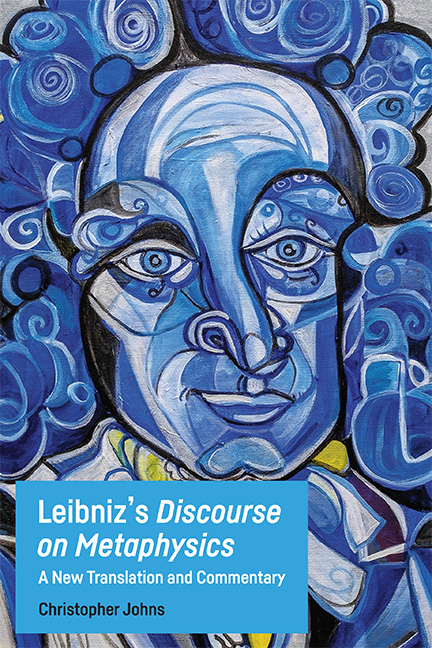Book contents
- Frontmatter
- Contents
- Acknowledgements
- Preface
- Introduction to Leibniz’s Life and Work
- Translation of the Discourse on Metaphysics
- Commentary on the Discourse on Metaphysics
- Context I Two Years of The Life and Work of G. W. Leibniz: January 1685 to December 1686
- Context II Translations of Letters Selected from 1685
- Bibliography
- Index of Names
- Index of Terms
Context I - Two Years of The Life and Work of G. W. Leibniz: January 1685 to December 1686
Published online by Cambridge University Press: 17 November 2023
- Frontmatter
- Contents
- Acknowledgements
- Preface
- Introduction to Leibniz’s Life and Work
- Translation of the Discourse on Metaphysics
- Commentary on the Discourse on Metaphysics
- Context I Two Years of The Life and Work of G. W. Leibniz: January 1685 to December 1686
- Context II Translations of Letters Selected from 1685
- Bibliography
- Index of Names
- Index of Terms
Summary
The Life and Work of G. W. Leibniz, a Chronicle provides a detailed account of Leibniz’s activities, mostly his letters and writings, from birth to death. I translate here only two years of the Chronicle: from January 1685 (one year prior to the composition of the Discourse) until December 1686 (one year after). I have added some items not included by the Chronicle, though not all of Leibniz’s works and letters written during that time are included below. Based on all available Akademie editions, Leibniz composed a total of approximately 315 items (including the ninety-six listed below) from January 1685 to December 1686.
The Chronicle shows that Leibniz was occupied with numerous projects and a wide range of interests, primarily with designing and improving windmills and pumps for the Harz mountain mining project, and gathering historical and geographical information for the House of Guelph ancestry. He also composed a number of letters and tracts on mathematics (including the introduction to his calculus), geometry, and ecumenical matters, along with some various points of philosophy and theology, including several letters to Arnauld specifically about the Discourse. Several works indicate Leibniz’s in-depth knowledge of engineering and practical mechanics, which should reassure us that his criticisms of Cartesian mechanics were not simply dreamed up in a mathematical armchair. As Leibniz travels extensively throughout the Harz mountain region by horse-drawn wagon, he characteristically draws up plans for redesigning the axles to make for a smoother journey (see entry of 26 December 1686).
The Chronicle’s sources (such as Ravier [R], Gerland [LGD], and Akademie [AA]) are indicated below. For example, ‘(AA I, 4 N. 308)’ refers to AA, Series I, Volume 4, piece number 308. If the piece can be found in the Akademie Edition, I have updated the reference and the date. Also, I replace the Chronicle’s square brackets with parentheses in order to indicate my additions within square brackets. I have added the footnotes and included the titles given in non-English languages as they are given in the Chronik.
1685
[ January 8: Short letter to Veit Ludwig von Seckendorff (1626–92), historian, jurist, and statesman, on a passage from Aristotle’s Eudemian Ethics, relevant to the ‘agent intellect’ and the Averroist interpretation (AA II, 1 N. 249, translated in this volume).]
- Type
- Chapter
- Information
- Leibniz's Discourse on MetaphysicsA New Translation and Commentary, pp. 301 - 315Publisher: Edinburgh University PressPrint publication year: 2023



